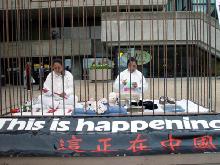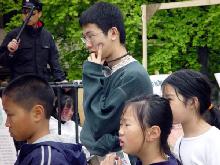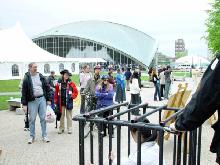(Clearwisdom.net, May 20, 2005) On May 14, 2005, the Massachusetts Institute of Technology (MIT) Program on Human Rights and Justice held a large symposium entitled, "Forced Labor in the Global Economy." Attendees of the symposium were from across the USA and the majority of them were scholars, human rights leaders, government officials and media focusing on human rights, law and forced labor. Among those who participated were Deputy U.S. Secretary of Labor Steven Law, chief author of the International Labor Organization (ILO) Roger Plant, Terry Collingsworth of the International Labor Rights Fund and Stephen King, Director of the BBC World Service Trust.
Outside the symposium hall, Falun Gong practitioners staged reenactments of the Chinese Communist Regime's forced labor and torture methods. Among the topics of discussion at the symposium was China's dumping cheap merchandise produced by forced labor.
1. The display of products made by forced labor and the reenactment of torture methods in China shocked symposium participants
In one area of the reenactment of torture methods, there was a large iron cage with two women practitioners with make-up resembling cuts and bruises on their faces. The women were sewing and preparing products for export, such as toys, clothes and chopsticks. The "World Organization to Investigate the Persecution of Falun Gong" (WOIPFG) made eight large posters to show various products being exported that are produced by imprisoned practitioners in Chinese forced labor camps. Graphs and legends on the posters explained the statistics. Visitors were shocked by the torture means depicted. Many said that they knew there was slave labor in China but never thought it was so rampant and that it was used to persecute Falun Gong practitioners.
People thanked the Falun Gong practitioners for their explanation of the facts of the persecution and brought press clippings on the forced labor of Falun Gong practitioners to the conference hall to share with others. People were indignant at the Chinese Communist regime's trampling of human rights, and its damaging the balance of trade and the U.S.' labor interests. They expressed the need to take counter measures. One speaker, Mr. Kevin Bales, director of Free the Slaves, accepted the report summary on slave labor prepared by WOIPFG and said he would make further investigations.
|
|
|
|
2. Major discussion on China's slave labor
The first half of the symposium was hosted by WBUR-TV, a well known station in Boston. In a question and answer session, a reporter asked, "The slave labor issue in China is encouraged and protected by the whole country's apparatus. For example, the labor camps producing slave labor merchandise get tax deductions and assistance in exporting their goods. China's slave labor is much like the Falun Gong practitioners' reenactment outside the conference hall. Such merchandise, exported to our country, presents unequal competition. What can U.S. labor unions, human rights organizations and government do?"
Though there were a few attendees taking the position that "China's reform is a process and better than before," Terry Collingsworth of the International Labor Rights Fund pointed out, "If we don't talk about the rampant slave labor in China but discuss slave labor in a small village in India, our efforts will be in vain. So far there has been no government to take actual countermeasures against China. But we have to do this."
3. The largest U.S. labor union asked the Bush administration to take action
It was reported that the largest U.S. labor union, the AFL-CIO, passed a petition resolution that represented thirteen million members, including six million workers in the manufacturing industry. Based on Section 301 of the Trade Act of 1974, the resolution pointed out that the Chinese communist regime continuously violates its labor force's human rights and as a result of the unequal trade, the United States lost 727,000 jobs. The resolution mentioned that the Chinese communist regime prohibits workers from forming independent labor unions, and uses slave labor and child labor. The Bush administration is requested to take action and countermeasures to the unfair practices of the Chinese regime.









